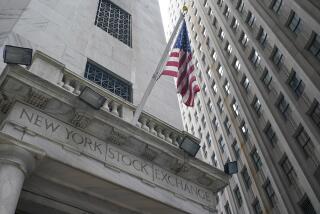‘Vultures’ Circling Depressed Securities
- Share via
“Vulture” investors, who specialize in buying the riskiest securities on Wall Street, are swooping in to scoop up bonds of troubled telecom firms, some trading at just pennies on the dollar.
But many of the bonds continued to slide Thursday as other investors fled, fearful of being caught in the next corporate blowup.
Likewise, the common stocks of many cable TV companies fell sharply for a second day, reflecting Wall Street’s concerns that the industry’s accounting methods could be masking deeper losses, analysts said.
Among cable firms, Cablevision Systems’ shares sank $1.39 to $8.11 and AOL Time Warner fell as low as $12.75 before rebounding somewhat to close unchanged at $13.63.
Telecom giant WorldCom Inc.’s shocking disclosure this week that it misaccounted for $3.9 billion in expenses over the last five quarters triggered another massive selling wave in the telecom sector, already deeply depressed.
Many analysts expect WorldCom, burdened by nearly $30 billion in debt, to file for bankruptcy protection soon, though the company has denied it will seek bankruptcy.
As pension funds and other institutional investors have bailed out of bonds of WorldCom and other telecom companies, money managers who take gambles on such distressed securities have been stepping up.
Those investors, nicknamed vultures, include Marty Whitman of the Third Avenue Funds in New York. He said he bought about $150 million of WorldCom’s senior debt Wednesday.
Some WorldCom bonds have been trading as low as 11 cents on the dollar, down from 40 cents before the company reported the accounting scandal late Tuesday.
Vulture investors have plenty of other distressed bonds to pick from. For example, cable firm Charter Communications’ 8.63% bonds maturing in 2009 were trading at 76 cents on the dollar Thursday, down from 81 cents Wednesday and 95 cents in early May.
In the telecom sector, Lucent Technologies’ 7.25% bonds maturing in 2006 fell to 78 cents on the dollar Thursday from 93 cents Wednesday. Lucent stock fell to a new record low, down 6 cents to $1.52 on the New York Stock Exchange.
In a bankruptcy, a company’s common stockholders often end up with nothing, because they’re last on the list of those with claims on the company’s assets. Bondholders are paid before them, and usually can expect to recover some percentage of the bonds’ face value.
For vulture investors such as Whitman, the trick is either to find deeply depressed bonds of companies that are likely to stay financially viable, or to estimate how much bondholders ultimately might be awarded by a Bankruptcy Court if a company fails.
With WorldCom bonds at pennies on the dollar, Whitman said, “I think the probabilities I will make money are on my side.”
Wilbur Ross, chairman of investment firm W.L. Ross & Co. in New York, said he began buying WorldCom bonds Wednesday morning at 7 a.m. “Buying these bonds at 12 and 13 cents on the dollar strikes us as a high-rate-of-return proposition,” said Ross. “We had not, thank goodness, been buying the bonds before that.”
Indeed, investors who bought telecom bonds at what they thought were distressed prices a few months ago have suffered huge paper losses as the bonds have fallen further, and more of the companies appear to be in grave danger of bankruptcy.
Though vulture investors often are betting on bankruptcy, dealing in distressed securities is always very risky, analysts note.
“It’s very treacherous,” said Russ Belinsky, senior managing director with Chanin Capital Partners, a restructuring advisory firm in Santa Monica. “You have to look very closely at the business plan [likely to be] coming out of a reorganization.”
In the cable sector, the sell-off this week in the industry’s bonds and stocks has been fueled by worries that the companies’ favored measure of profit, which ignores their expenses for long-term capital expenditures, has been vulnerable to manipulation.
WorldCom is accused of booking normal operating expenses as capital expenditures, allowing the company to report a profit when it, in fact, was deep in the red.
Jessica Reif Cohen, analyst at Merrill Lynch & Co., said in a report Thursday that the cable industry’s reputation for large capital expenditures “reignited concerns that cable companies could also be overcapitalizing expenses” and overstating cash flow, according to Reuters, which obtained a copy of the report.
What’s more, the failure of cable firm Adelphia Communications, also embroiled in an accounting scandal, has tainted investors’ view of the entire industry.
But Cohen argued in the report that the accounting worries are “overblown.”
RELATED STORIES
Probes: Congress opens WorldCom investigations. A1
Pension funds: Telecom giant’s woes inflict $1-billion hit. C4






